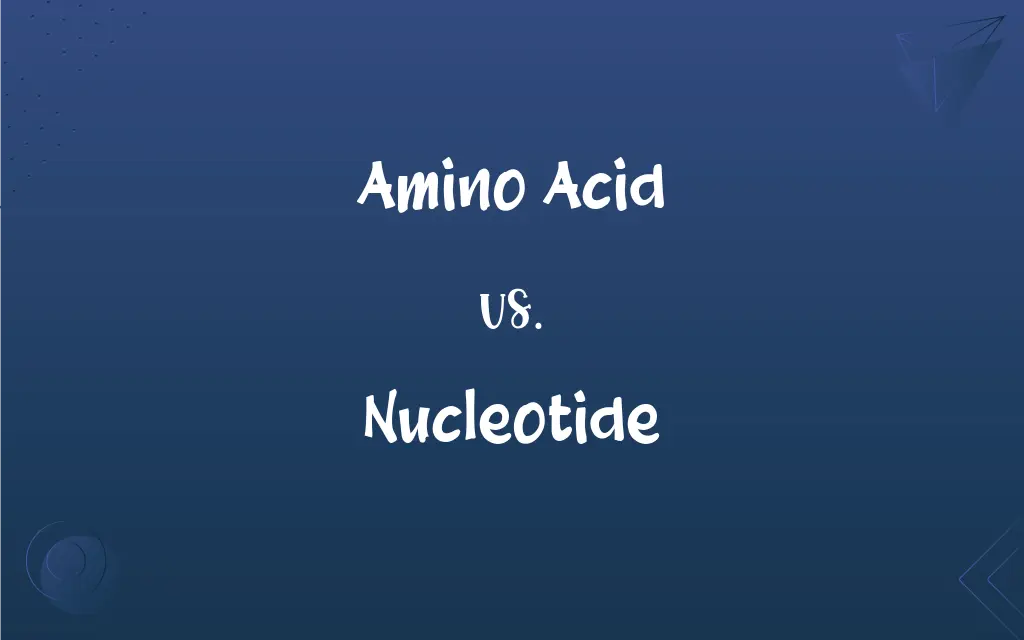Amino Acid vs. Nucleotide: What's the Difference?
Edited by Aimie Carlson || By Harlon Moss || Published on January 2, 2024
Amino acids are the building blocks of proteins, whereas nucleotides are the building blocks of nucleic acids like DNA and RNA.

Key Differences
Amino acids are organic compounds that combine to form proteins, essential for various biological functions. Nucleotides, consisting of a sugar, phosphate group, and nitrogenous base, are the basic units of nucleic acids, crucial for genetic coding and energy transfer.
Amino acids play a vital role in building and repairing tissues and synthesizing proteins, enzymes, and hormones. Nucleotides are involved in storing and transmitting genetic information and are key components in cellular energy transfer, as seen in ATP.
There are 20 standard amino acids that form the diverse range of proteins. Nucleotides come in different types (like adenine, thymine, guanine, cytosine, and uracil) and combine to form the genetic code in DNA and RNA.
Amino acids are synthesized in the body or obtained from diet, and their sequence determines protein structure and function. Nucleotides are synthesized in the body from simpler molecules; their arrangement in DNA and RNA dictates genetic information.
Both amino acids and nucleotides are fundamental to life, but they serve different purposes: amino acids primarily build and maintain the body's proteins, while nucleotides are key to genetic coding and intracellular energy processes.
ADVERTISEMENT
Comparison Chart
Function
Building blocks of proteins
Building blocks of nucleic acids
Composition
Composed of an amino group, carboxyl group, and side chain
Composed of a sugar, phosphate group, and nitrogenous base
Role
Protein synthesis, tissue repair
Genetic coding, cellular energy transfer
Varieties
20 standard types
Several types, including ATP, GTP, DNA, and RNA components
Biological Process
Involved in enzyme and hormone production
Involved in storing/transmitting genetic information
ADVERTISEMENT
Amino Acid and Nucleotide Definitions
Amino Acid
Organic compounds forming the building blocks of proteins.
Lysine is an essential amino acid important for muscle growth.
Nucleotide
Comprises a nitrogenous base, a sugar molecule, and a phosphate group.
The sugar in DNA nucleotides is deoxyribose.
Amino Acid
Can be essential (obtained from diet) or non-essential (synthesized by the body).
Some amino acids, like tryptophan, must be obtained from food.
Nucleotide
Basic structural units of nucleic acids, such as DNA and RNA.
Each nucleotide in DNA contains one of four bases: adenine, thymine, cytosine, or guanine.
Amino Acid
Contains an amino group and carboxylic acid group.
The structure of each amino acid gives proteins their unique properties.
Nucleotide
Essential for the storage and transmission of genetic information.
The sequence of nucleotides in DNA determines genetic traits.
Amino Acid
Essential for protein synthesis and tissue repair.
Amino acids are vital for post-workout muscle recovery.
Nucleotide
Nucleotides like ATP are involved in cellular energy transactions.
ATP, a nucleotide, is the main energy currency of the cell.
Amino Acid
Amino acids have a central role in metabolism.
Amino acids are converted into various substances, like neurotransmitters.
Nucleotide
Nucleotides play a key role in cellular processes and metabolism.
Cyclic AMP, a nucleotide, acts as a secondary messenger in many biological processes.
Nucleotide
Any of a group of compounds consisting of a nucleoside combined with a phosphate group and constituting the units that make up DNA and RNA molecules.
Nucleotide
(biochemistry) The monomer constituting DNA or RNA biopolymer molecules. Each nucleotide consists of a nitrogenous heterocyclic base (or nucleobase), which can be either a double-ringed purine or a single-ringed pyrimidine; a five-carbon pentose sugar (deoxyribose in DNA or ribose in RNA); and a phosphate group.
Nucleotide
A phosphate ester of a nucleoside; one of the monomeric components of DNA or RNA.
Nucleotide
A phosphoric ester of a nucleoside; the basic structural unit of nucleic acids (DNA or RNA)
FAQs
What are nucleotides?
The basic structural units of nucleic acids, like DNA and RNA.
What is the role of nucleotides in cells?
They are involved in genetic coding and cellular energy transfer.
Are all amino acids the same?
No, each amino acid has a unique side chain that defines its properties.
What are amino acids?
Organic compounds that are the building blocks of proteins.
How do nucleotides form DNA?
They link together in sequences to form the double helix of DNA.
What foods are rich in amino acids?
Protein-rich foods like meat, eggs, and legumes are good sources.
How many amino acids are there?
There are 20 standard amino acids.
What are the components of a nucleotide?
A nitrogenous base, a sugar molecule, and a phosphate group.
Do nucleotides have a role in energy metabolism?
Yes, ATP, a nucleotide, is crucial for energy transfer in cells.
Can the body produce all amino acids?
The body can produce non-essential amino acids but not essential ones.
Is RNA made of nucleotides?
Yes, RNA is a chain of nucleotides.
How are amino acids linked in proteins?
Through peptide bonds, forming a polypeptide chain.
What is the difference between DNA and RNA nucleotides?
DNA nucleotides have deoxyribose sugar, while RNA nucleotides have ribose sugar.
Do vegetarians get enough amino acids?
With a balanced diet, vegetarians can obtain all essential amino acids.
What is a non-essential amino acid?
An amino acid that can be synthesized by the human body.
What is the significance of nucleotide sequencing?
It is crucial for understanding genetic information and inheritance.
How are nucleotides important in genetic research?
They are fundamental in studying genetics and hereditary diseases.
Are nucleotides only found in DNA?
No, they are also found in RNA and energy molecules like ATP.
How do amino acids affect health?
They are essential for growth, repair, and metabolism in the body.
Can amino acid supplements benefit health?
They can benefit in certain conditions, like muscle recovery.
About Author
Written by
Harlon MossHarlon is a seasoned quality moderator and accomplished content writer for Difference Wiki. An alumnus of the prestigious University of California, he earned his degree in Computer Science. Leveraging his academic background, Harlon brings a meticulous and informed perspective to his work, ensuring content accuracy and excellence.
Edited by
Aimie CarlsonAimie Carlson, holding a master's degree in English literature, is a fervent English language enthusiast. She lends her writing talents to Difference Wiki, a prominent website that specializes in comparisons, offering readers insightful analyses that both captivate and inform.

































































